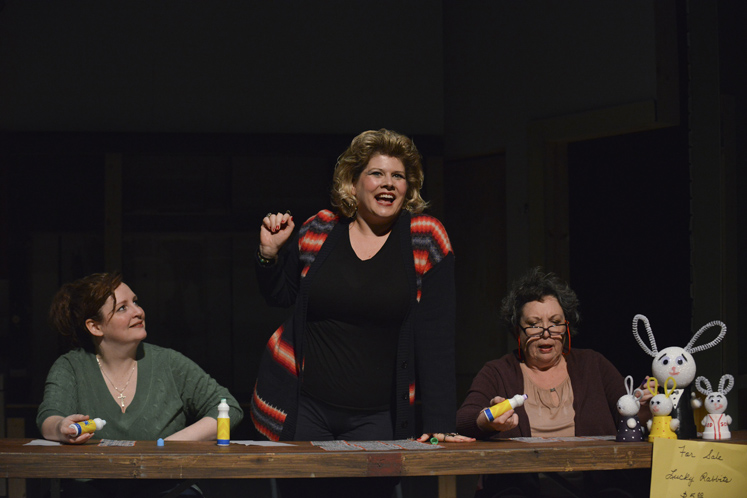“Good” is an ambiguous word. Its meanings range from “of high quality” to “of somewhat high but not excellent quality.” Much the same can be said for Good People. Playwright David Lindsay-Abaire followed up his Pulitzer Prize-winning sob-fest Rabbit Hole with this tepid exploration of luck and fate in South Boston. It’s not high quality, per se, and it’s pretty ambiguous. Unfortunately the production at WaterTower Theatre falls squarely into the adjective’s second definition.
The “somewhat high” qualities come mainly in the form of its supporting cast. Michelle Courtney Schwartz is making her WaterTower debut alongside WTT mainstay Pam Dougherty. They deliciously embody the bickering, Bingo-playing pals of Jessica Cavanagh’s Margie, a struggling single mother whose intentions and motives are not always clear.
When Margie, freshly let go from the dollar store, looks up former classmate Mike, a successful doctor, and finagles an invite to his birthday party in tony Chestnut Hill, you just know things aren’t going to end well. The pleasant surprise comes in the form of JuNene K., playing Mike’s sleek and unsatisfied wife, Kate. Also making her WaterTower debut, the actress gives Kate—who could easily be perceived as petulant and snooty—more than enough shading to make the character sympathetic, humorous, and engaging.
The same cannot be said for Margie (with a hard “g”) and Mike, however. Relying on Boston accents as flighty as Johnny Damon’s MLB affiliations, Cavanagh and James Crawford emerge as two of the most unlikable and unsympathetic dramatic characters in recent memory. It’s difficult to see what draws Margie to Mike other than a fascination with his success: He escaped Southie to become a rich fertility doctor. Otherwise, he’s patronizing, lacking in charm, and more than a little insensitive. Plus, even though the script specifies Mike is a year or two younger than Margie, the opposite age gap is startling enough to wonder if maybe Mike couldn’t have been Margie’s much-older uncle.
Margie fares even worse. Under René Moreno’s direction, she seems steered by curiosity and spite more than the supposedly fierce need to provide for her daughter, unwilling to let Mike forget that his familial influence helped propel him out of the neighborhood and ostensibly away from Margie’s hardscrabble life. She refuses to let even the smallest slight go, turning her into an unrelenting shrew who doesn’t know when to quit.
Lindsay-Abaire has an irritating habit of running thoughts into the ground, insisting his characters repeat and reword the same thought over and over to the point where any normal person would have exploded and cut through the bullshit already. The cyclical dialogue feels even more jarring when bookended by scene change music that, rather than relate to the emotional trajectory of the scene, seems chosen by sound designer Kellen Voss only for its Boston affiliations: Dropkick Murphys, New Kids on the Block, Marky Mark, etc. Somewhat related in theory, yet definitely not excellent in execution.





